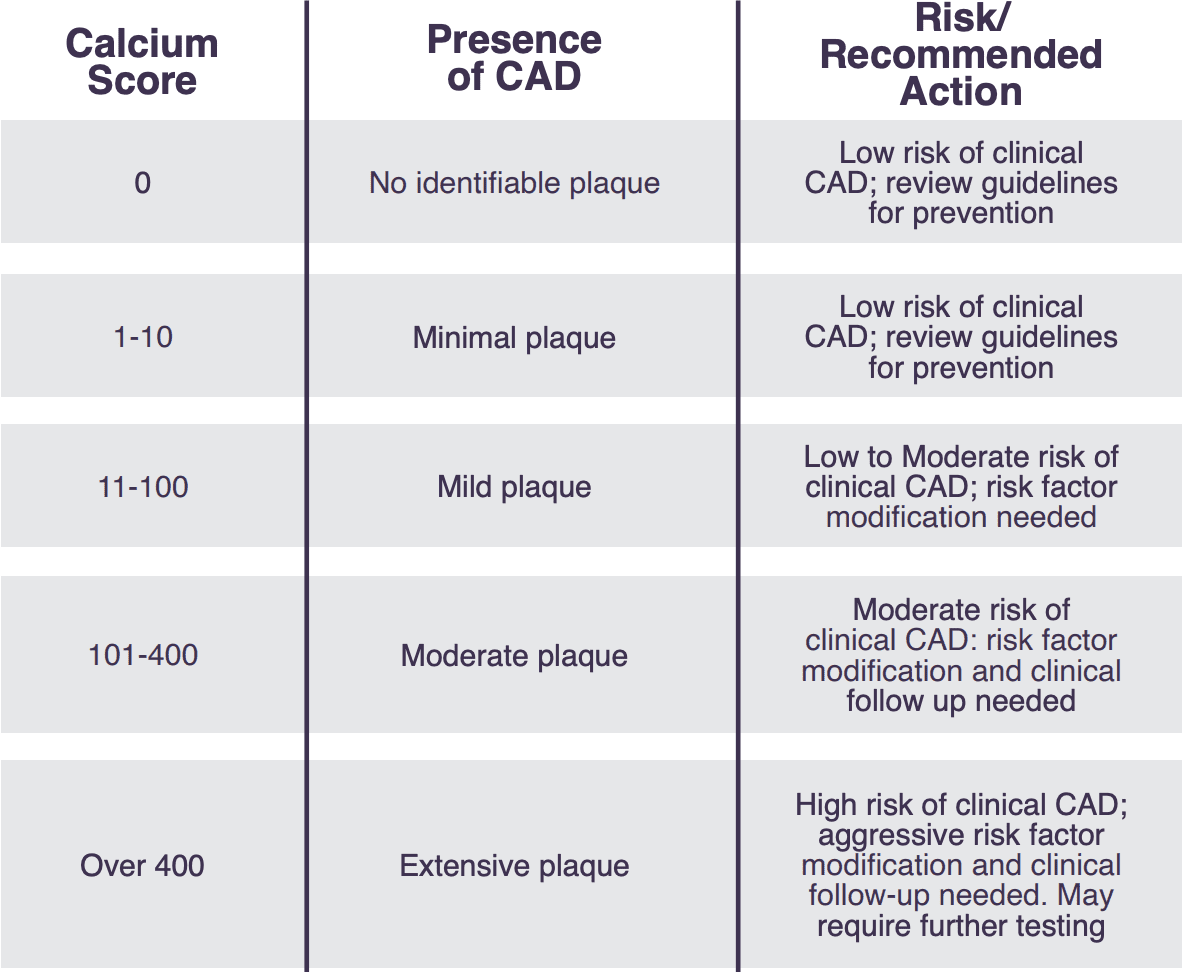Heart CT Scan for Calcium Screening Scoring
The cost for this exam is $150 Plus tax. This exam is not currently covered by insurance.
Heart disease is the leading cause of death in this country. Also referred to as Coronary Artery Disease (CAD), heart disease occurs when the lining of the arteries that supply blood to the heart become hardened, stiffened and swollen with plaque. Plaque is a build-up of fat and other substances, including calcium, which can, over time, narrow the arteries or even close off blood flow to the heart. The result may be painful angina in the chest or a heart attack.
State-of-the-art computed tomography (CT) can be used to detect calcium deposits found in plaque in the coronary arteries. A Heart CT Calcium Score Scan uses a relatively low radiation dose and is a non-invasive exam. The purpose of heart CT calcium scoring is to determine if CAD is present and to what extent, even if there are no symptoms. Calcium scoring is used to estimate the amount of calcium in the coronary arteries. More coronary calcium suggests a greater likelihood of significant narrowing in the coronary arteries and a higher risk of future cardiovascular events. It is a screening study that may be recommended by a physician for patients with risk factors for CAD, even with no clinical symptoms.
Anyone with one of the following conditions SHOULD NOT have a Heart CT Scan for Calcium Screening Scoring:
- Atrial Fibrillation
- History of Coronary Bypass Graft(s) or CABG
- History of Coronary Stent(s)
- Patient weight above table weight limit of 450 lbs.
- Pregnancy
What to expect during the test
- You will change into a hospital gown.
- The technologist will have you lie on the examination table.
- Electrodes (sticky patches) will be attached to your chest and to an electrocardiograph (ECG) machine that records the electrical activity of the heart. Men may expect to have their chest partially shaved to help electrodes stick.
- The high-speed CT scan captures multiple images, synchronized with your heartbeat. Please note: If your heart rate is over 80 beats per minute, your exam may need rescheduling, as a high heart rate may interfere with the test. During the scan, you will feel the table move inside a donut-shaped scanner.
- You will be asked to hold your breath for a period of 10-15 seconds while images are recorded. Breathing instructions are important to follow.
- The entire procedure including the actual CT scan is usually completed within 30 minutes.
- A physician will analyze the images and a report will be sent to you within a few days
How to prepare for the test
- Schedule your test by calling 505-332-6967.
- Arrive 15 minutes prior to the scheduled test.
- Avoid caffeinated drinks and food (coffee, tea, soda, chocolate) 4 hours prior to the test.
- Avoid energy drinks, diet pills or decongestants 24 hours prior to the test.
- No nicotine 12 hours prior to the test.
- Avoid stimulants and medications contraindicated with nitrates (Viagra, Cialis, etc.) 48 hours prior to the test.
- CT scanners use x-rays. The test is not recommended if you are pregnant.
Major risk factors for CAD:
- Abnormally high blood cholesterol levels
- Male over 45 years of age, female over 55 years of age
- Family history of heart disease
- Past or present cigarette smoker
- Being physically inactive
- High blood pressure
- Being overweight
- Diabetes
Heart CT Scan for Calcium Screening Scoring Interpretation
- A negative scan shows no calcification within the coronary arteries. Although it does not exclude the presence of “soft” non-calcified plaque.
- A positive scan means that CAD may be present.
- The results of the exam should be discussed with your healthcare provider.

